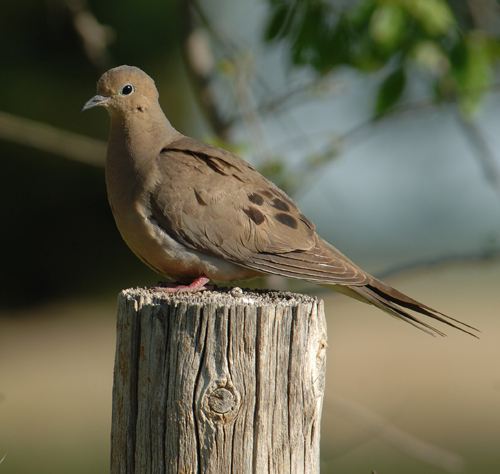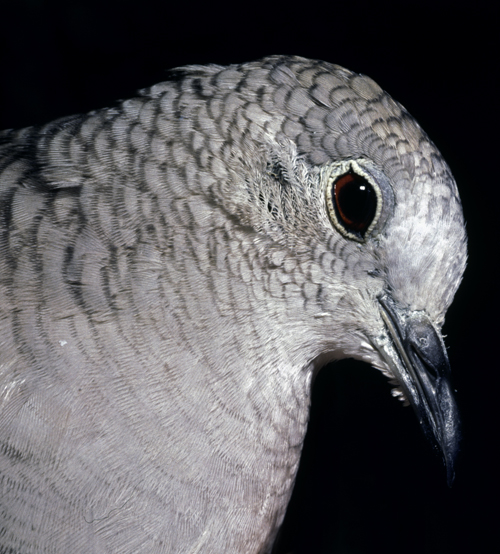The doves are power cooing the windows out of their frames. How did doves and lost love become synonymous? The only sadness I feel is for lost sleep. The main chorus consists of white-winged and Eurasian collared-doves. Both are immigrants. White-wings were limited in my childhood to a few scattered through oaks around the court house. Collared doves were unknown. Now both blanket the city, and I often see droves lined shoulder-to-shoulder, wingtip-to-wingtip, along the telephone wires. This morning the crowds have apparently chosen my yard for their caroling. Cucurrucucú, paloma, ya no le llores.
Within this cooing cacophony I detect the slight, almost apologetically soft flutes of the Inca dove. The Inca is also an immigrant, arriving on the island in the 1950s. The Inca survives around the edges, avoiding being bounced by the brutes. I rarely see more than a few together, quietly sifting for seeds through the scalped grass at the Ursuline Convent. The only loser to the recent immigrants is the native mourning dove. Mourning doves have been forced from many Texas urban centers out to the hinterlands.
These changes have taken place over the brevity of one lifetime – mine. I wonder how many people noticed. Perhaps the incessant noise of urban life, the auditory trash, inures us to the coming and going of nature. Our senses are cauterized, and that which we should miss never exists in the first place. Who can hear the pleadings of an amorous dove through ear buds?
Recently I drove to Rockport for a lunch meeting, and once finished curved north along the Texas Coastal Bend before returning home. Time spent along the Texas coast will leave you with two distinct impressions. First, the Texas coast is chock-a-block with birds, particularly doves. Nowhere can they be escaped. Second, also inescapable is the debris and detritus of humanity. Only in protected areas (refuges, private ranches, sanctuaries) and in a few caring towns can you avoid the abandoned double wides, scoured industrial sites, belching refineries and factories, and the tattered, sclerotic communities that define the coast. Yes, we share some of our trashiness with others around the Gulf of Mexico. The truth is inescapable – we are awash in visual and auditory trash. Humans and garbage walk hand in hand along this beach.
I confess; I am an Aldo Leopold aficionado. In college I found his writing tiring, even depressing. Now, at age 60, I hang on his every word. Here is Aldo’s take on the human existence:
One of the penalties of an ecological education is that one lives alone in a world of wounds. Much of the damage inflicted on land is quite invisible to laymen. An ecologist must either harden his shell and make believe that the consequences of science are none of his business, or he must be the doctor who sees the marks of death in a community that believes itself well and does not want to be told otherwise.

Few of us care enough to make the effort. Birding is a game, a pastime through which we relax and escape. We are fortunate, for numbers of birds readily adapt to highly altered landscapes and our disinterest. We look for crows at dumps (aka landfills), waterfowl in settling ponds, pelagics from rip-rap jetties, and shorebirds on tidal flats created by these jetties. Most of us bird in damaged landscapes; few us of have ready access to “wilderness.”
But a park and a trash heap are different. A park is modified, but in a way that most of us find pleasing. Trash is an affront to the senses, yet people, like birds, seem to adapt to a degraded circumstance. Why?
I know the standard arguments – ignorance and poverty. But I have traveled to places where the poor did not live in squalor, where people took pride in the very little that they had scraped together in this life. Along the Texas coast, between these spellbinding protected lands, I see little pride. What I see are heaps of trash.
My family fled to Texas from hard-scrabble Mississippi immediately following the Civil War. I love my state as much as anyone, and from that attachment comes my anger and disgust. Perhaps we in conservation have spent so much time fighting for protected places that we overlooked what surrounds them. Shouldn’t conservation bleed into communities as well?
Nabokov said:
I prefer to accept only one type of power: the power of art over trash, the triumph of magic over the brute.
I hope that no one is born a brute, but I do see many (or evidence of many) who have forsaken art and beauty. Enter birding. Birds, to me, are art more than biology. If we hope to touch the insensate masses, we must use poetry and song as much as prose and science. This is the reason that so many Americans still struggle with global climate change, and, in many cases, are aggressive deniers. With all of our proof, all of our science, we have failed to give the common man the slightest reason to care.
Birds see a world at risk where our crude actions, our trash, spoils even the most rudimentary existence. But birds cannot speak for themselves. We must be their voice to testify. It is not enough to only see, to only watch.
Scream.
Ted Lee Eubanks
15 October 2010
